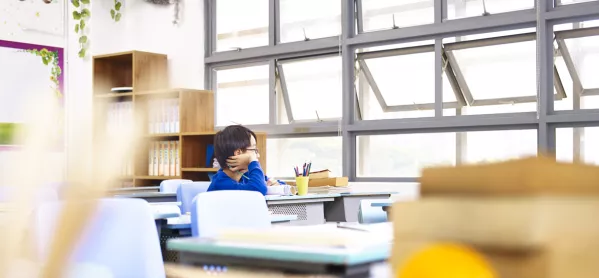- Home
- ‘I feel sorry for you, sir’: pupils’ views of lockdown
‘I feel sorry for you, sir’: pupils’ views of lockdown

“It’s not fair,” is by far the most common phrase I hear in relation to Covid-19 from students.
It’s hardly surprising. Our children were housebound for months and schooled via Zoom or Teams or Mum and Dad. And now they find themselves packed off into the same school buildings they were once told were unsafe. Their confusion is tangible.
Many column inches have been written in response to the coronavirus pandemic and the way schools have tackled its dangers. Plenty of teachers and government spokespeople have weighed in, but the voices everyone claims to speak on behalf of seem sorely under-represented: the children’s own.
Coronavirus: When 1,400 pupils equals 2,800 lungs
But most of them aren’t shy about saying what they think. I asked today’s Year 7 class how they felt about their school’s response to the pandemic. One girl blithely announced, “There’s 1,400 kids in this school. That’s 2,800 lungs. What’s a one-way system going to do?”
It’s a mature reply, even if her primary reason for responding seemed to be to show off her maths skills.
Mostly, the class feels as much is being done as it can be, and they’re clearly relieved life is more or less how it was before lockdown. They’re back with their friends, and that counts for more than the “smelly” sanitiser or the “uncomfortable” masks they’re required to wear in the corridors.
For some children, the pandemic is simply something they hear about on the news, like a far-off earthquake or the apparently eternal US election.
Worries about grandparents
But for others, it has hit closer to home. This school is in Sussex, a comparatively safe corner of the country, and one that jumped straight from medium threat, or tier one, to lockdown overnight. But a random sample of children reveals that about half know someone who’s contracted the virus.
Sometimes, these stories tend towards the apocryphal, with a mother who had flu-like symptoms last Christmas, or a friend’s friend who self-isolated. But a boy tells me about a grandparent who was on a ventilator over the summer, and another lost their grandmother to the virus at the peak of the pandemic.
Hands are seldom raised when I ask if any of the class are worried about contracting the virus themselves. But when pressed on whether they’re concerned about members of their family getting sick, everyone raises a hand.
Another student moans about the trains and buses they crowd on to at the end of the day, and how not everyone wears a mask because “they’re Karens”.
A girl near the back feels particularly aggrieved. “I can’t go to my mate’s house, but we’re allowed to crush against one another at the snack shack.”
‘I feel sorry for you, sir’
Her words remind me of the teacher who complained she wasn’t allowed to visit her mother in her care home, but was expected to lend pens to 15-year-olds in a small, cramped classroom.
It’s the same argument, from the same side of the fence. The rest of the country is shut. The butchers. The bookies. The barbershop. But here we all are, breathing the same air as those 2,798 other lungs.
“I feel sorry for you, sir,” one student tells me, assuming I’m higher risk than she is, which is probably true. “‘The government says kids are safe from it, but you’re not, are you?”
I get sympathetic looks. But if I momentarily recoil when a child approaches the desk, I feel awful.
“Out of interest,” I ask, “who thinks the school should shut?” A volley of arms. That’s everybody, then.
But it’s a different story at key stage 4. The Year 11 students want their teachers on hand. They’re worried about another closure, and memories of this summer’s GCSE controversies are fresh.
The older children are not in bubbles, because of their subject options, but no one delights in mock-coughing at the back of a classroom here, or hides the sanitiser from the rest of the class while laughing at the audacity of their own larceny. For these children, another lockdown spells hard work from home, and the uncertainty of March all over again.
The stress of not knowing
“I’m stressed because I don’t know,” one Year 11 girl tells me. “I can handle being at school. I can handle being at home. I can’t handle not knowing if I’m at school or at home. Last time, we were here one minute and then suddenly we were told to go home for the rest of the year.” She expects a U-turn. Many do.
“The best way through all this is to pretend things are normal,” a boy suggests. “Just imagine it’s not happening.”
This opinion causes an argument that threatens to derail the lesson. “You can’t convince yourself you’re immune,” comes the counterstrike. “That’s why we’re in this mess.”
Nonetheless, I follow the boy’s advice and change the subject. The lesson resumes.
The shadow of coronavirus hovers constantly at the back of students’ minds. It pushes some to get work completed quickly. It paralyses others.
News of a vaccine promises hope, but the winter will have a few more surprises in store for us, and every child here knows it.
It’s not fair.
Paul Read has been teaching for 15 years, and currently works as a supply teacher in East Sussex
Keep reading for just £1 per month
You've reached your limit of free articles this month. Subscribe for £1 per month for three months and get:
- Unlimited access to all Tes magazine content
- Exclusive subscriber-only stories
- Award-winning email newsletters



